
Swimming pool repair is a general term that can refer to dealing with cracks in the pool walls, tears in the lining, and inoperable or poor filter and pump systems. Most of these problems require hiring a professional. Some of them are also large, expensive repairs, while most cost under $1000. Understanding what you’re getting yourself into will enable you to make an informed decision. Sometimes it’s not about repairing your swimming pool but replacing an inferior or outdated component of your pool.
Swimming Pool Structural Repair
Concrete, vinyl, and fiberglass are the three main types of swimming pool materials. They each have relative advantages and disadvantages. Each one can be susceptible to a different type of disrepair.
- Concrete pools can become cracked, especially in colder regions where extreme winter temperatures can cause this cracking through a freeze-and-thaw process. Minor cracks can be patched; bigger cracks may require you to completely overhaul your pool.
- Vinyl pools are vulnerable to tears in the lining. Again, small tears can be repaired; larger tears may require you to replace the lining. The good news here is that replacing a liner will obviously be cheaper than replacing concrete.
- Fiberglass is nearly indestructible but reactions to minerals and other chemicals can cause an ugly discoloration. If this discoloration gets too bad, an acid wash is probably your best bet.
Ready to start your Pool Repair?
Find ProsSwimming Pool Repair: Pumps and Filters
Unless your pump or filter breaks down entirely, it may not always be clear when one isn’t working properly. Worse yet, it’s possible both the filter and the pump are working fine, but the pool professional installed a system where the pump and filter don’t work particularly well together. This is more common in older, above ground pools. On the other hand, a problem with your pump or filter can mean nothing more than a clogged or damaged hose. Even a properly working pump and filter system won’t prevent water quality problems without the proper chemical treatments. Check the hoses and other easily accessible parts of your pool filtration system. If you can’t identify the problem, you may need to call a pool professional, but be able to describe the exact symptoms and the model of your filtration system so you and your pool professional can efficiently work out the problem.
Safety Features
If a part of your pool system suddenly stops working, it may be a sign that a safety feature has disabled it to protect both swimmers in the pool and the pool system itself. Swimming pool repair can be a hassle, but it’s a lot better than electrocution. Pool heaters and pool covers are two installations that often have safety shut-offs. Remember, though, that this sudden shut-off may be an effect of a relatively minor problem that can be easily fixed.
Repair or Replace?
Regardless of the nature of your swimming pool repair, you should always your pool professional what the condition of your pool will be after the repair. Older filters and pumps can be repaired only to break down again the following year. Ask how long the concrete patch can be expected to last. Resurfacing is another option that falls somewhere between a simple repair and full replacement. Pool resurfacing costs less than a full replacement and can make your pool feel new. You don’t want to spend a bunch of money to repair a piece of your pool when replacing or resurfacing it wouldn’t cost significantly more.
 Swimming Pool Glossary
Swimming Pool Glossary  Pros, Cons & Costs: Fiberglass Pools
Pros, Cons & Costs: Fiberglass Pools  Indoor Hot Tub: A Steamy Situation
Indoor Hot Tub: A Steamy Situation  Quick Tips for a Summer-Ready Pool
Quick Tips for a Summer-Ready Pool  Get in Shape with an Endless Pool
Get in Shape with an Endless Pool 

Are You Familiar With This Topic? Share Your Experience.